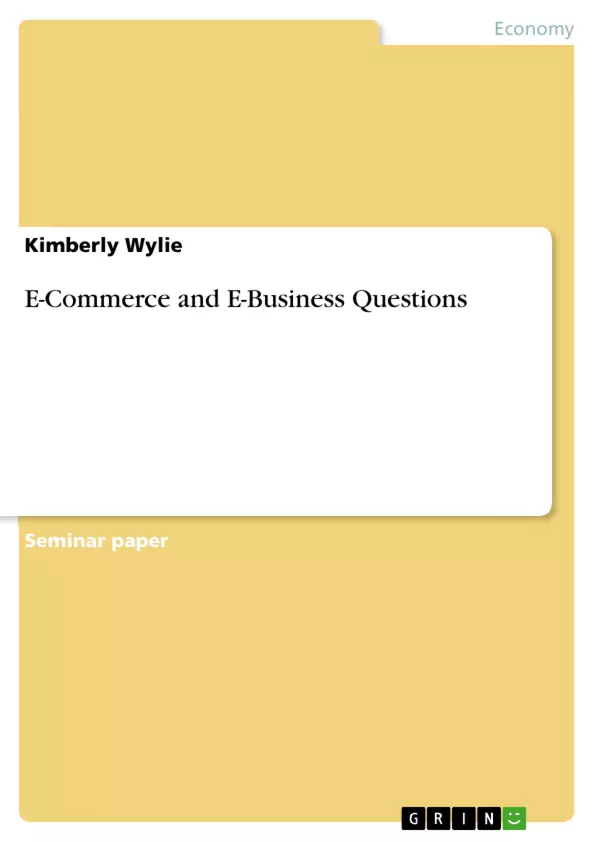This paper answers four discussion questions concerning various electronic marketing concepts. First, the difference between e-commerce and e-business is discussed. Second, details are given why B2B has greater potential than B2C. Third, the concept of disintermediation is discussed and what type of business could benefit most from this concept. And finally, reintermediation as a concept is discussed and which type of business could benefit most from this concept.
Table of Contents
- Abstract
- E-Commerce and E-Business Questions
- What is the difference between e-commerce and e-business?
- Why do some people say B2B has greater potential than B2C?
- What type of e-business would benefit from disintermediation?
- What type of e-business would benefit from reintermediation?
- References
Objectives and Key Themes
This paper aims to clarify key concepts in electronic marketing by addressing four discussion questions. It explores the distinctions between e-commerce and e-business, examines the potential of B2B compared to B2C models, and analyzes the benefits and applications of disintermediation and reintermediation in different e-business contexts.
- The difference between e-commerce and e-business
- The comparative potential of B2B and B2C business models
- The application and benefits of disintermediation in e-business
- The application and benefits of reintermediation in e-business
Chapter Summaries
E-Commerce and E-Business Questions: This chapter delves into the core differences between e-commerce and e-business. While e-commerce is defined as electronically conducted business involving monetary transactions, exemplified by online retailers like Amazon, e-business encompasses a broader scope, including marketing, procurement, and consumer education. E-business integrates various organizational systems with partners, customers, and employees, creating integrated supply chains and real-time information sharing. While e-business offers enhanced efficiency and collaboration, it also increases competition and consumer expectations for transparency and information.
Why do some people say B2B has greater potential than B2C?: This section compares B2B (business-to-business) and B2C (business-to-consumer) models. B2B involves supply chain management and direct transactions between vendors and distributors using online technology, facilitating electronic transfer of orders, invoices, and payments. B2C, exemplified by eBay and Amazon, focuses on direct sales to end users. The argument presented is that B2B possesses greater potential due to its collaborative nature, encompassing joint design, production coordination, and overall supply chain integration. This fosters stronger relationships and improves competitiveness across the board, offering advantages even if consumer preferences shift away from online shopping.
What type of e-business would benefit from disintermediation?: This section explores disintermediation—the removal of intermediaries from the supply chain. High market transparency allows buyers to purchase directly from manufacturers, bypassing wholesalers and retailers. The chapter uses computer sales as a prime example, highlighting that the clear product specifications, tech-savvy customer base, and significant cost savings make this industry particularly suited to disintermediation. The advantages stem from the product's suitability for online evaluation and the potential for substantial cost reductions by eliminating middlemen.
Keywords
E-commerce, E-business, B2B, B2C, Disintermediation, Reintermediation, Supply Chain Management, Online Transactions, Electronic Marketing, Market Transparency.
Frequently Asked Questions: A Comprehensive Language Preview
What is the difference between e-commerce and e-business?
E-commerce refers to electronically conducted business involving monetary transactions (like online retail). E-business encompasses a broader scope, including marketing, procurement, consumer education, and integrating organizational systems with partners, customers, and employees to create integrated supply chains and real-time information sharing. While e-business offers enhanced efficiency and collaboration, it also increases competition and consumer expectations.
Why do some argue that B2B has greater potential than B2C?
B2B (business-to-business) involves supply chain management and direct transactions between vendors and distributors using online technology. B2C (business-to-consumer) focuses on direct sales to end users. B2B is argued to have greater potential due to its collaborative nature, including joint design, production coordination, and supply chain integration. This fosters stronger relationships and improves competitiveness, offering advantages even if consumer preferences shift.
What type of e-business would benefit from disintermediation?
Disintermediation is the removal of intermediaries from the supply chain, allowing buyers to purchase directly from manufacturers. Industries with high market transparency, clear product specifications, and tech-savvy customers benefit. Computer sales are a prime example, as the products are easily evaluated online, and eliminating middlemen leads to significant cost savings.
What are the key themes explored in this preview?
The preview explores the distinctions between e-commerce and e-business, compares the potential of B2B and B2C models, and analyzes the benefits and applications of disintermediation and reintermediation in various e-business contexts.
What are the objectives of this paper?
The paper aims to clarify key concepts in electronic marketing by addressing four discussion questions related to e-commerce, e-business, B2B, B2C, disintermediation, and reintermediation.
What are the key words associated with this preview?
E-commerce, E-business, B2B, B2C, Disintermediation, Reintermediation, Supply Chain Management, Online Transactions, Electronic Marketing, Market Transparency.
What topics are covered in the chapter summaries?
The chapter summaries delve into the core differences between e-commerce and e-business, compare the potential of B2B and B2C models, and explore the application and benefits of disintermediation in e-business.
- Citar trabajo
- Kimberly Wylie (Autor), 2003, E-Commerce and E-Business Questions, Múnich, GRIN Verlag, https://www.grin.com/document/60673



